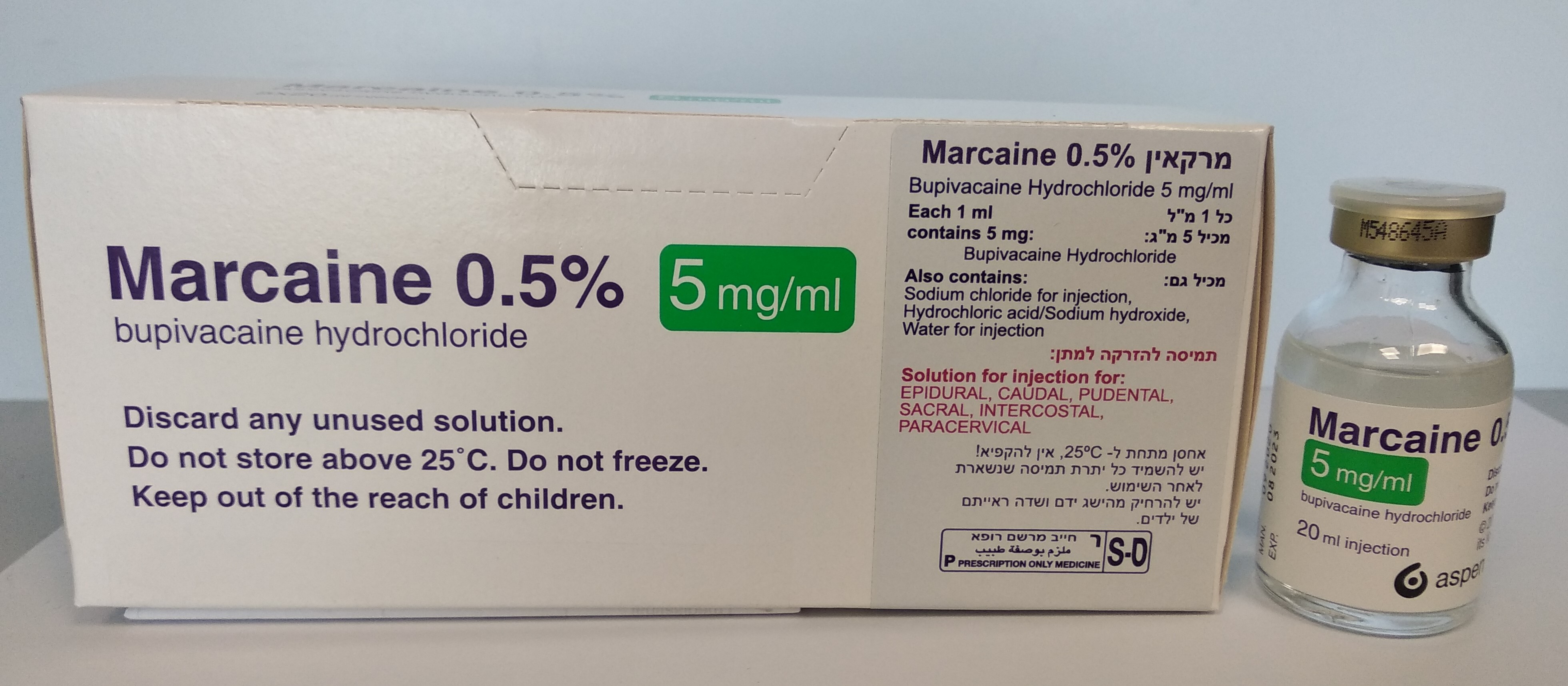Quest for the right Drug

מרקאין % 0.5 MARCAINE 0.5 % (BUPIVACAINE HYDROCHLORIDE)
תרופה במרשם
תרופה בסל
נרקוטיקה
ציטוטוקסיקה
צורת מתן:
אפידורל, לתוך הזנבעצם הזנב, לתוך עצב, לאגן, לעצבי הצלעות, זריקה באזור צוואר הרחם : EPIDURAL, CAUDAL, PUDENTAL, SACRAL, INTERCOSTAL, PARACERVICAL
צורת מינון:
תמיסה להזרקה : SOLUTION FOR INJECTION
עלון לרופא
מינוניםPosology התוויות
Indications תופעות לוואי
Adverse reactions התוויות נגד
Contraindications אינטראקציות
Interactions מינון יתר
Overdose הריון/הנקה
Pregnancy & Lactation אוכלוסיות מיוחדות
Special populations תכונות פרמקולוגיות
Pharmacological properties מידע רוקחי
Pharmaceutical particulars אזהרת שימוש
Special Warning עלון לרופא
Physicians Leaflet
Overdose : מינון יתר
4.9 Overdose Acute systemic toxicity: Symptoms: Systemic toxic reactions include effects on the central nervous system and cardiovascular system. These reactions are caused by high blood concentrations of local anaesthetic, which may arise due to inadvertent intravascular injection, overdose or unusually rapid absorption from highly vascularised tissues (see also section 4.4, Special warnings and precautions for use). CNS symptoms are similar for all amide-type local anaesthetics, however cardiac symptoms differ between different medicinal products, both quantitatively and qualitatively. Inadvertent intravascular injections of local anaesthetics can cause immediate systemic toxic reactions (within seconds to a couple of minutes). Signs of systemic toxicity in the case of overdose occur later (15-60 minutes after injection) due to a slower increase in the blood concentration of the local anaesthetic. CNS toxicity appears gradually, with symptoms and reactions of increasing severity. The initial symptoms are usually a feeling of intoxication, circumoral paraesthesia, tongue numbness, hyperacousis, tinnitus and visual disturbances. Articulation difficulties, muscle spasms or tremor are more severe symptoms and precede generalised convulsions. These symptoms should not be interpreted as neurotic behaviour. Unconsciousness and grand mal convulsions can follow the symptoms listed above, and may last from a few seconds to several minutes. Hypoxia and hypercapnia develop rapidly, with subsequent convulsions due to increased muscle activity and insufficient ventilation. Respiratory arrest may occur in severe cases. Acidosis intensifies the toxic effects of local anaesthetics. Recovery is dependent on the metabolism of the local anaesthetic and on distribution away from the central nervous system. The process is rapid unless very large amounts of medicinal product have been injected. Cardiovascular effects usually indicate a more serious situation and are usually preceded by signs of CNS toxicity, however these may be masked by general anaesthesia or heavy sedation with drugs such as benzodiazepines or barbiturates. Blood pressure drops, bradycardia, arrhythmia and even cardiac arrest can occur as a result of high systemic concentrations of local anaesthetic. Cardiovascular toxic effects are often related to depression of transmission in the heart and myocardium which lead to decreased minute volume, hypotension, AV block, bradycardia and sometimes ventricular arrhythmias including ventricular tachycardia, ventricular fibrillation and cardiac arrest. These conditions are often preceded by signs of severe CNS toxicity such as convulsions, but in rare cases cardiac arrest has occurred in the absence of prodromal CNS effects. Following a very rapid intravenous bolus injection, the blood concentration of bupivacaine can be so high in the coronary vessels that circulatory effects arise, alone or preceding CNS effects. Myocardial depression can occur via this mechanism, potentially as the initial symptom of toxicity. Extra attention must be paid to early signs of toxicity in paediatric patients, as children do not usually receive large blocks until after general anaesthesia has been initiated. Treatment: Adequate ventilation (free airways, oxygen, and intubation and controlled respiration if required) must be ensured in the case of total spinal blockade. In the case of a fall in blood pressure or bradycardia, administer a vasopressor, preferably with inotropic effect. If signs of acute systemic toxicity appear, administration of the local anaesthetic must be immediately suspended and CNS symptoms (convulsions, CNS depression) treated immediately with optimal oxygen supply/ventilation support and the administration of anticonvulsants. If circulatory arrest should occur (hypotension, bradycardia), appropriate treatment with IV fluids, vasopressors, inotropic agents and/or lipid emulsions should be considered. Children should be administered doses in proportion to their age and body weight when treating systemic toxicity. If circulatory arrest should occur, cardiopulmonary resuscitation should be commenced immediately. Optimal oxygenation, ventilation and circulatory support as well as treatment of acidosis are of vital importance. Extended resuscitation may be warranted in the case of circulatory arrest.

שימוש לפי פנקס קופ''ח כללית 1994
לא צוין
תאריך הכללה מקורי בסל
01/01/1995
הגבלות
תרופה שאושרה לשימוש כללי בקופ'ח
מידע נוסף
